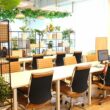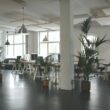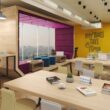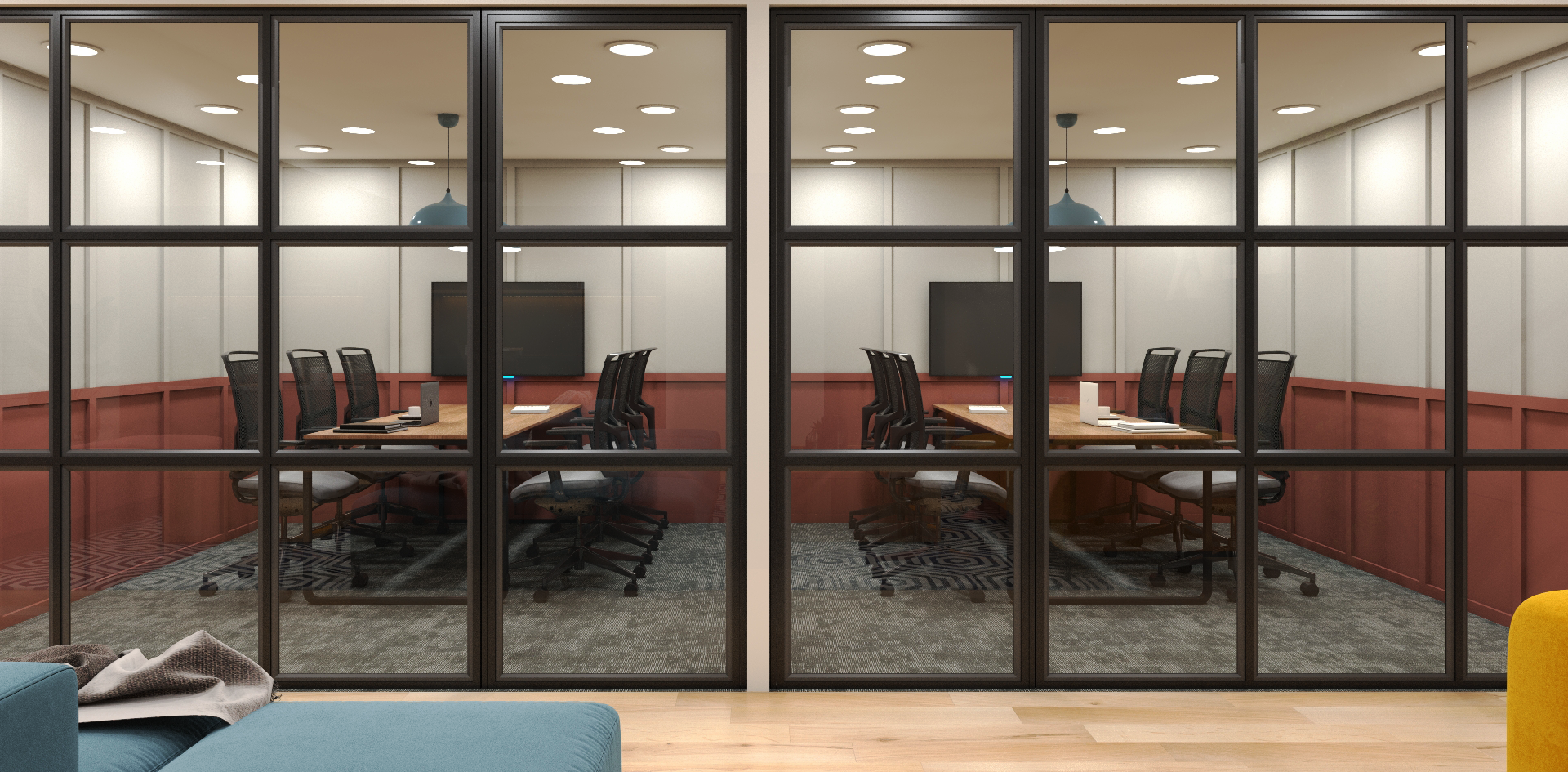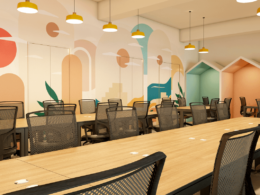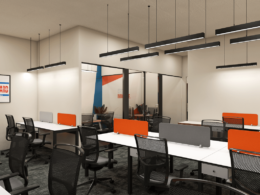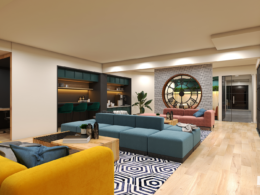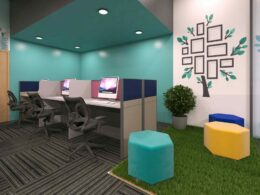Taking into consideration the needs of the employees of a workplace is the easiest way of staying relevant, in terms of design, in contemporary times.
Other ways of giving a workspace a contemporary look can include employment of unconventional material in design practices or using too many or absolutely no colors at all. Following is a list of approaches that can be used while designing or enhancing an office interior.
Industrial Office Design
The industrial office design concept started getting popular in the early 2000s. The key features of any interior with this concept of design are the following – visibly unfinished wooden furniture, brick walls that give off a very raw appeal, large open spaces that are majorly uncovered, and are almost devoid of any large furniture.
This category of interior design concepts is usually used by brands and companies that wish to tell their clients and other visitors how unconventional they are as opposed to their fellow competitors. Such companies use design to portray themselves as a group of individuals who like to think out of the box and look forward to listening to new and untraditional ideas.
Such spaces are created by using recovered factory spaces etc. Using up an old space, however, requires a lot of caution so that a decades-old building can successfully run a business for decades to come.
Ergonomic Workstations
Daylong commitments are quite normal in today’s working culture but sitting at one place is more than just sometimes responsible for causing severe health issues.
Ergonomic chairs and exercise ball chairs have now become the face of ergonomic workstations. While ergonomic chairs facilitate regular bodily movement in the chair itself, sitting on an exercise ball chair lets a person exercise as and when they are working for they can move/bounce up and down and thereby help their muscles relax and avoid getting a stiff body at the end of the day.
Desk risers are another exciting and innovative feature of ergonomic workstations. They allow people working for really long hours to stand and work and not toy with their posture as they accomplish the same.
Spondylitis and other spine-related illnesses are some of the many illnesses that can be triggered by a stagnating way of working throughout the day. Using one of the above-mentioned innovative solutions in an office can benefit people’s health as well as modernize the space and give it a contemporary look.
Glass Doors and Walls
Glass doors and walls are all over Instagram today, and the reason behind the same is people’s fascination with natural light. While attaching a bulb or lamp in every corner of a building that seeks light is easily doable, it is expensive and almost unnecessary.
A space that entirely depends on artificial light not only is wasting energy but is, in fact, the worst consequence of poor design sensibilities. Following the pragmatic appeal of glass doors and walls is their sheer magnificence. Glass partitions not only make a space look fancy but, in fact, make physical barriers less restricting and more transparent – quite literally transparent in this case.
The added advantage of a glass wall dividing two sections of a space is the soundproof structure of glass. People can avoid hustling in isolation and yet keep away from unwanted noise.
Activity-Based Working
Activity-based working is a concept in design that is used by designers to fill a building with spaces and corners that suit the needs of all kinds of official interactions and practices.
For example, in an activity-based working environment, there would be a peaceful corner somewhere in the building that can be used by someone looking to write a report in isolation.
The same building on the other side would have an open space where a group of employs can gather and chatter to brainstorm over upcoming deals and campaigns of the company. Such a concept is a highly evolved version of the same, mundane cubicle culture that is followed by certain offices even today.
Flexible Workspaces
Change is the only constant, and flexible workspaces are a design-driven example of the same. Such workspaces resemble activity-based workspaces in the sense that they both don’t require people to sit in the same allotted spot for each and every activity throughout their tenure with the company.
These workspaces are flexible to an even greater extent as opposed to activity-based working spaces as they have furniture that is moveable and resizable. Instead of having to move your entire setup of work from one room to another, you can just roll your desk or chair or both to wherever you wish.
Nature-based Workspaces
The only thing that has been disconnecting the working population from the world outside their cubicles and cabins is the absence of greenery around them. Looking at naturally green spaces has been proved to be refreshing and beneficial for one’s mental wellbeing.
Bringing the outside inside the offices of people is the best a designer can do for them. It is not only an iconic innovation in the world of design but also a practical choice that eliminates expenditure on uselessly fancy design props that crowd office walls and serve no purpose.
This approach is termed biophilic design, and it is currently in vogue owing to its visually refreshing appeal and the creative approach behind it.
Green plants are able to provide an atmosphere of ease throughout a workstation and let people working inside that space feel less stressed and tired.
Home Away from Home
Turning a workstation into a space that is able to make any person working there feel at home is a really popular design tactic right now. Keeping in mind the amount of time that people across the globe have spent working from home, helping them acclimatize again in their workstations is the responsibility of designers.
Anything that is vibrant, lively and comfortable, and not too monotonous can be used to adorn a workspace to make it homely as well as stylish.
Other ways of creating a home away from home can be the addition of recreational spaces around the workspaces of people so that they can use them to relax in their break time and get back to work feeling absolutely refreshed.
Adding leisurely components, however, doesn’t translate to an ‘all play and no work’ culture. Meeting areas can use some comfortable furniture that is vibrantly colored so that people don’t feel too intimated by the dull colors that encase them and be the most creative versions of themselves.
Going All-White
Using a monotonously colored interior can make a place look bigger than it actually is. While one is actually planning to accomplish the same, white is the best option they can use.
White walls against light-brown wooden furniture can not only make the space look bigger but can, in fact, turn it into a refreshing visual masterpiece.
Not adding too many colors or complex design patterns to a workstation is the best way of turning it into a relaxing space that is classy too. More white means more light. Combining white with a single bright color can be used to highlight a certain space in the office.
While we’re at combinations, we can even combine two contemporary approaches – glass doors and all-white walls and turn a simple space into its classiest version. In such a space, if natural light is properly utilized, one doesn’t need to spend lavishly on exorbitantly priced furnishings, etc.
Black and White
If you’re going to use a color combination to adorn the walls of your workspace, the best choice to make is going all classic. Using black and white can add both depth and texture to any space.
While black can be used around all the work equipment, white can be used to highlight the same and balance the mood of the room that is otherwise largely drenched in the blank
While setting up black furniture against a majorly white background is a popular choice, reversing the same can make any simplistically designed interior gorgeous.
The color palette of such an interior can be complemented by using more black and white objects that go with the overall appeal of the space.
Colorful Design
While it is usually creative agencies and other places with similar cultures that use brightly colored interiors, there are no rules that restrict absolutely any workstation from using as much color as it deems necessary.
Color never goes out of style. Using a particular color palette that uses the right amount of light and bright shades of different colors can liven any space up.
If an individual is about to dedicate a major part of her or his day to working in a single place, the place being lively will only help them feel a lot more at ease as opposed to working in a mundane environment.
Colorful interiors can be complemented with even more colorful frames or colorful furniture.
Conclusion
The above list has a myriad of options that can be used by people to make their spaces look trendy, classic, elegant, and stylish – all at once. People can even combine two or more approaches to add a contemporary look to their office interiors.
